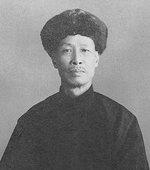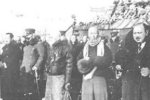Zheng Xiaoxu
| Surname | Zheng |
| Given Name | Xiaoxu |
| Born | 2 Apr 1860 |
| Died | 28 Mar 1938 |
| Country | China |
| Category | Government |
| Gender | Male |
Contributor: C. Peter Chen
ww2dbaseZheng Xiaoxu was born in Suzhou, Jiangsu Province, China in 1860. In 1882, he passed the imperial examinations and entered government service during the Qing Dynasty. In 1891, he became a member of the Chinese legation in Tokyo, Japan. Subsequently, he was named the head of the Chinese consulate in Tsukiji and then a similar position in Kobe-Osaka. He was active in the organization of the Kobe Chinese community in that city. He returned to China at the start of the First Sino-Japanese War in 1894 and served in various positions including some time at the Beijing-Hankou Railway and at the regional government in Guangxi Province. In 1911, when the Qing Dynasty was overthrown by the Republic of China, he was serving as a high level official in Hunan Province. Refusing to serve the republic, he retired and moved to Shanghai; it was during his years in Shanghai that his hobby in calligraphy blossomed into a career which would not only secure a handsome income for the remainder of his life, but also carving his name in modern Chinese literary history. In 1924, Puyi, the deposed Emperor Xuantong of Qing who had been permitted to remain in the Forbidden City in Beijing, China, was forced out; Zheng, having returned to Imperial household service in 1923, arranged for Puyi's relocation first to the Japanese embassy and then to Japanese-controlled area in Tianjin, China in 1925. During the late 1920s, Zheng worked closely with domestic and Japanese forces which were interested in seeing the return of Qing. At the outbreak of the Mukden Incident, he formally appealed to Japan, and from this point on played a key role in the 1932 establishment of the Japanese-sponsored puppet state of Manchukuo in northeastern China; Zheng would write the lyrics of the Manchu national anthem and served as the country's first prime minister. Although he had gained the unsavory reputation as a collaborationist by this time, he viewed himself as a patriot, and devoted himself to running Manchukuo. The Japanese viewed him as a mere nominal leader, however, and often clashed with him, causing Zheng much frustration. In 1935, the Japanese forced Puyi, by now declared the Kangde Emperor of Manchukuo, to remove Zheng from the payroll. Taking the hint but with reluctance, he resigned as the head of government. He passed away suddenly from sickness in 1938 and was given a state funeral. Unconfirmed rumors claimed that he was poisoned by the Japanese.
ww2dbaseSources:
Baidu Baike
Wikipedia
Last Major Revision: Jun 2012
Zheng Xiaoxu Interactive Map
Photographs
 |  |  |  |
Zheng Xiaoxu Timeline
| 2 Apr 1860 | Zheng Xiaoxu was born in Suzhou, Jiangsu Province, China. |
| 8 Mar 1932 | Zheng Xiaoxu arrived at Xinjing, puppet state of Manchukuo (now Changchun, Jilin Province, China) by train. |
| 9 Mar 1932 | Zheng Xiaoxu was named the Prime Minister of the puppet state of Manchukuo. |
| 21 May 1935 | Zheng Xiaoxu resigned as the Prime Minister of the puppet state of Manchukuo. |
| 28 Mar 1938 | Zheng Xiaoxu passed away in Xinjing, puppet state of Manchukuo (now Changchun, Jilin Province, China). |
Please consider supporting us on Patreon. Even $1 per month will go a long way! Thank you. Please help us spread the word: Stay updated with WW2DB: |

» Battle of Harbin and Establishment of Manchukuo
Document(s):
» Japan-Manchukuo Protocol
- » 1,178 biographies
- » 337 events
- » 45,089 timeline entries
- » 1,245 ships
- » 350 aircraft models
- » 207 vehicle models
- » 376 weapon models
- » 123 historical documents
- » 261 facilities
- » 470 book reviews
- » 28,480 photos
- » 365 maps
Winston Churchill, on the RAF
Please consider supporting us on Patreon. Even $1 a month will go a long way. Thank you!
Or, please support us by purchasing some WW2DB merchandise at TeeSpring, Thank you!